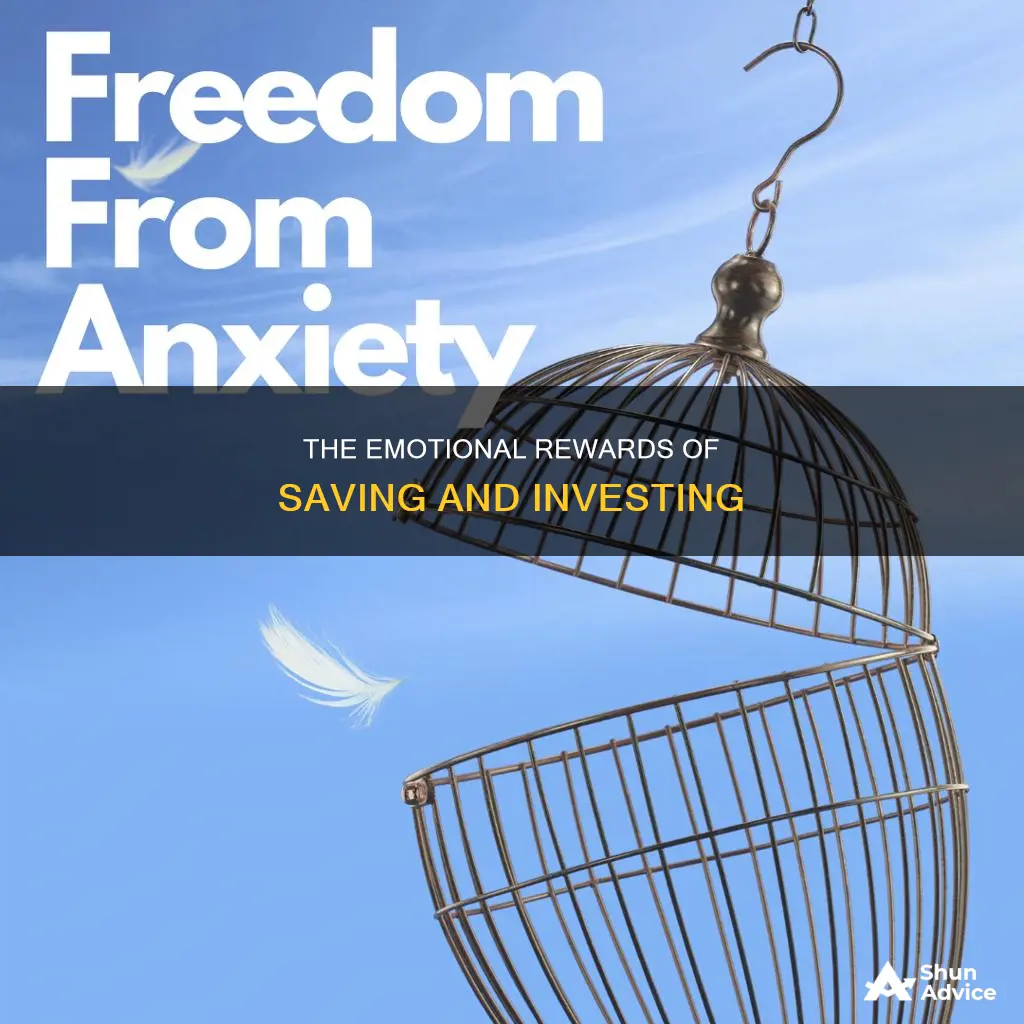
Saving and investing are both important concepts for building a sound financial future, but they are not the same thing. While both can help you achieve a more comfortable financial future, it's important to know the differences and when it's best to save and when it's best to invest. The biggest difference between saving and investing is the level of risk taken. Saving typically results in a lower return but with virtually no risk, while investing allows for the opportunity to earn a higher return, but you take on the risk of loss. Emotions play a big part in both saving and investing, and understanding your emotional response to money can lead to better financial decision-making.
| Characteristics | Values |
|---|---|
| Feelings | Elation, panic, anxiety, fear, desperation, excitement, optimism, euphoria, confidence, satisfaction |
| Reason for saving/investing | Love for family, need for security, hopes for the future, financial security, achieving short-term goals, financial stability, achieving long-term goals |
| Downsides of saving | Missing out on potential higher returns, losing purchasing power due to inflation |
| Downsides of investing | Risk of loss, requires discipline and long-term commitment, may require longer time horizons |
What You'll Learn

Euphoria and optimism during market highs
Euphoria and optimism are common feelings during market highs. When the market is doing well, investors feel optimistic and excited about the future. This can lead to a sense of euphoria, where investors feel invincible and believe that the bull market will last forever. However, it is important to recognise that this is also when investors are most vulnerable as the market will eventually take a turn.
During market highs, investors may feel a sense of overconfidence and believe that they have what it takes to be successful. This can lead to increased investing and taking on more risk. It is important to remember that the market is cyclical and what goes up must come down. Investors who get too caught up in the euphoria may find themselves unprepared for the eventual downturn.
The "Euphoriameter", a composite of surveyed investor sentiment, implied volatility, and valuations, can help signal when the market is reaching a peak. When sentiment becomes euphoric, there is a greater chance of disappointment if reality does not match the optimism. This is when investors need to be wary and consider taking some profits off the table.
It is natural to feel a sense of euphoria and optimism during market highs, but successful investing requires a long-term perspective and discipline. Investors should be aware of their emotional triggers and how they can impact their decision-making. It is important to zoom out and stay focused on the bigger picture, rather than getting caught up in the short-term highs and lows of the market.
Additionally, investors can consider strategies such as dollar-cost averaging and diversification to help reduce the impact of emotions on their investment decisions. By investing a fixed amount at regular intervals and diversifying their portfolio, investors can take advantage of market highs while also being prepared for potential downturns.
Overall, while euphoria and optimism during market highs can feel great, investors should remain cautious and maintain a long-term perspective to avoid making impulsive decisions that may lead to losses.
Savings and Investments: Strategies for Success in Lean Times
You may want to see also

Anxiety, fear, desperation, and panic during market lows
Market lows can evoke a range of emotions, from anxiety and fear to desperation and panic. Here are some strategies to help you navigate through these challenging times:
Recognize Emotional Triggers
It's natural to experience emotions when investing, and being aware of your emotional triggers can help you make more informed decisions. Recognize that emotions like anxiety, fear, and panic are common during market lows.
Zoom Out and Focus on the Bigger Picture
During market lows, it's crucial to maintain a long-term perspective. Successful investing is not about reacting to short-term market fluctuations but setting long-term goals and sticking to a well-defined plan. Remember that markets are cyclical, and lows are often followed by opportunities for growth.
Seek Professional Advice
Consider working with a financial advisor who can provide perspective and help you make decisions aligned with your goals. Advisors can offer valuable emotional support and ensure you don't feel alone in navigating market lows.
Practice Emotional Regulation
Give yourself time and space to process your emotions. Avoid making impulsive decisions in the heat of the moment. Take a step back, breathe, and assess your convictions. Remind yourself that you're a long-term investor, and market lows are part of the journey.
Evaluate Your Investments
During market lows, evaluate the underlying health of your investments. If you invest in individual stocks, assess the performance of the companies and whether your investment thesis remains valid. Strong businesses can weather market storms and deliver returns over the long run.
Take Advantage of Opportunities
Market lows can present buying opportunities. If you have the risk appetite and financial flexibility, consider investing in undervalued assets or taking advantage of tax strategies like tax-loss harvesting. Remember to assess your risk tolerance and overall financial situation before making any decisions.
Focus on Long-Term Goals
Remind yourself of your long-term financial goals. Market lows can be an opportunity to re-evaluate and adjust your investment strategy to ensure it aligns with your goals. Stay committed to your plan and remember that investing is a marathon, not a sprint.
Savings Investment Strategies: Accessibility and Growth
You may want to see also

The role of a financial advisor in managing emotions
Financial advisors play a crucial role in helping clients manage their emotions when it comes to saving and investing. Emotions and investing are closely intertwined, and it's natural for investors to experience a range of feelings, from anxiety and euphoria to optimism and excitement. Recognising and understanding these emotional responses is essential for making better financial decisions.
Providing Perspective
Financial advisors can provide a valuable outside perspective to help clients manage their emotions effectively. They can offer guidance during both the good times and the challenging periods, ensuring that clients' decisions align with their long-term goals and plans. This perspective can help clients avoid making impulsive decisions based on short-term market fluctuations.
Emotional Awareness
A key aspect of a financial advisor's role is to help clients become more aware of their emotional triggers and how these emotions can influence their investment choices. By understanding their clients' emotional responses, advisors can tailor their advice and strategies accordingly. This may involve asking clients reflective questions to uncover any underlying emotional biases or motivations that might impact their financial behaviour.
Strategies for Balancing Emotion and Logic
Financial advisors can also provide specific strategies to help clients balance their emotions with logical decision-making. This may include techniques such as reframing decisions to focus on positive emotions, enacting waiting periods to allow for calmer, more rational thinking, and encouraging clients to develop emotional intelligence to make more informed choices.
Accountability
Additionally, financial advisors hold their clients accountable for their decisions. When individuals know they need to explain and justify their choices to their advisor, they tend to focus more on the rational reasons behind their decisions. This aspect of the advisor-client relationship can help clients make more thoughtful and well-informed choices.
Expertise in Risk Management
Financial advisors are trained to understand and manage risk, which is inherent in any investment. They can guide clients in diversifying their portfolios to mitigate risks effectively. This expertise helps clients feel more confident in their investment decisions, even during volatile market conditions.
Support and Guidance
Ultimately, financial advisors provide ongoing support and guidance to their clients, helping them navigate the complex world of investing. They act as a trusted sounding board, offering advice that considers both the emotional and logical aspects of financial decision-making. This support can be invaluable in helping clients stay on track with their financial goals and avoid emotional investing pitfalls.
Invest Your Savings Wisely: A California Guide
You may want to see also

Overconfidence and the impact of natural biases
Overconfidence is a common issue in financial decision-making. It is a cognitive bias that leads individuals to overestimate their abilities, knowledge, and skills, resulting in poor judgement and decision-making. This bias can have a significant negative impact on investment returns.
There are several types of overconfidence bias:
- Illusion of Control: When people believe they have more control over outcomes than they do, leading to overestimating their ability to predict or influence market movements.
- Illusion of Knowledge: The belief that one has more information than they do, and that this information improves accuracy.
- Optimism Bias: When someone overestimates the likelihood of positive outcomes and underestimates the likelihood of negative outcomes, leading to underestimating risks.
- Miscalibration: The tendency to be overly confident in the accuracy of predictions, causing a disconnect between perceived and actual abilities.
Overconfidence can lead to:
- Excessive Trading: Overconfident investors trade more frequently, resulting in higher transaction costs and lower returns.
- Under-diversification: Overconfident investors may concentrate their investments in a few high-risk assets, believing they can accurately predict market movements.
- Underestimating Risk: Overconfidence can cause people to underestimate risks, leading them to take excessive risks or invest in high-risk assets without proper assessment.
- Ignoring Contradictory Evidence: Overconfident investors may dismiss information that contradicts their original decision, leading to maintaining positions in poorly performing investments.
To avoid overconfidence bias, consider the following strategies:
- Seek Diverse Opinions: Consult others and consider diverse perspectives to avoid relying solely on your own judgement.
- Continuous Education: Stay informed about market trends, new investment opportunities, and relevant research to keep your knowledge current.
- Keep an Investment Journal: Record your investment decisions, reasons, and outcomes to evaluate past performance and identify areas for improvement.
- Set Realistic Expectations: Remind yourself that market movements cannot be predicted with certainty, and be prepared for the possibility of losses and gains.
- Practice Self-Awareness: Regularly assess your confidence levels and question your beliefs, assumptions, and biases to keep them in check.
- Emphasize Risk Management: Focus on managing risk in your investment strategy rather than maximising returns to create a more diversified and resilient portfolio.
Other natural biases that impact saving and investing include:
- Greed and Fear: Powerful motives that can lead to buying at market tops and selling at market bottoms.
- Regret: The feeling of regret can cause investors to avoid selling losing positions and locking in losses, resulting in suboptimal decisions.
- Limited Attention Span: Investors tend to only consider stocks that come to their attention through media, friends, or other sources, rather than conducting their own research.
- Trend-Chasing: The tendency to follow herd behaviour and invest based on past performance, ignoring the disclaimer that "past performance is not indicative of future results."
Understanding these biases and their impact on decision-making is crucial for improving investment performance and achieving financial goals.
Savings-Investment Equilibrium: What's the Balancing Act?
You may want to see also

Emotional responses to money and their influence on decision-making
Money is an emotional topic that can push our buttons and elicit strong feelings such as elation during market highs and panic during downturns. Recognising and understanding our emotional responses to money and investing are crucial steps towards making better financial decisions. Even the most level-headed investor can get swept up in the inevitable ups and downs of the market.
Our emotional responses to money are deeply rooted in our psychology and evolution. Our brains are wired to respond to threats and opportunities, often resulting in 'fight or flight' responses that may lead to poor financial decisions. Behavioural finance expert Dr Daniel Crosby identifies four common 'mistakes' or biases that can compromise our thought processes: over-confidence or ego, emotion, attention, and conservatism.
Over-confidence
Over-confidence can lead to underestimating risks associated with investments. Less experienced investors may overestimate their understanding of the market or specific investments, leading them to try to time the market or invest heavily in riskier funds. This can result in overexposure and insufficient diversification. Understanding your attitude to risk is essential for effective financial planning. Financial advisors and fund managers are trained to recognise and mitigate these risks by diversifying investments across a wide range of funds.
Emotional state of mind
Our emotional state of mind can dramatically influence our perception of risk and reward. A buoyant mood may lead to underestimating risks, while a pessimistic outlook may cause us to panic and make impulsive decisions when markets fall. Seeking a second opinion from a financial advisor can help manage these emotions and ensure that short-term emotions do not compromise long-term investment success.
Reacting to short-term noise
As investors, it is crucial to avoid reacting to short-term market fluctuations and maintain a long-term perspective. Regularly meeting with a financial advisor can help investors stick to their plan and avoid the temptation to time the market based on daily news headlines.
Loss aversion
Psychologists refer to the tendency to 'play it safe' as 'loss aversion'. We tend to be more upset by losses than we are pleased by equivalent gains. This bias can lead investors to avoid unfamiliar options and take less risk than they should. Focusing on investments aligned with long-term goals often involves coping with short-term volatility.
Emotions play a significant role in our financial decision-making, and successful investing involves acknowledging and managing these emotions. While it is essential to make rational and realistic investment decisions, completely removing emotions from the equation may not be possible or necessary. Instead, investors should strive to recognise their emotional triggers and work towards balancing emotion and logic in their financial choices.
Saving and Investing: Your Guide to Financial Freedom
You may want to see also
Frequently asked questions
Saving is a great way to meet short-term financial goals and prepare for unexpected situations. It provides a financial safety net and liquidity for purchases. It also has minimal risk of loss as savings held at banks are protected by FDIC.
There is a possibility of missing out on potential higher returns from riskier investments. Savings can also lose purchasing power during periods of rising inflation.
Investing can make you feel excited and optimistic when the market is doing well. However, when the market takes a downturn, feelings of anxiety, fear, desperation, and panic may arise.
Investing has the potential for higher returns than savings accounts. It can help you grow your wealth over time through compounding and reinvestment, and it can also help you achieve your long-term financial goals, such as saving for retirement or buying a house.







